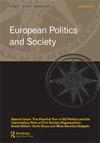左翼的倒退:或者维克托·奥尔班的右翼保守派非自由主义如何成为保加利亚政治话语中的规范理想
Q1 Social Sciences
引用次数: 4
摘要
本文探讨了保加利亚议会代表政党的领导人如何讨论2010-2019年期间青民盟的政策。此外,它试图解释为什么Orbán的保守非自由主义品牌已经成为许多保加利亚政党的规范理想,包括2016年之后的保加利亚社会主义者。本文认为,如果不承认非社会化对极右翼民族主义话语的复兴和崛起所起的作用,就无法理解中东欧(更具体地说是保加利亚)所谓的“民主倒退”。在资本主义自由市场和非公有制的共同框架下,从1990年代的自由主义到2008年后的保守主义发生了一系列意识形态的“滑坡”。正是保加利亚左翼思想的不断倒退,使得主要从保守的观点,甚至对社会主义者来说,批判自由主义成为可能。第三,本文认为,虽然保加利亚政客在国内场合赞扬Orbán及其保守的非自由主义,但他们在国际话语中口头上支持自由主义价值观,以这种方式先发制人地批评欧盟。正是Orbán公开的规范性意识形态挑战,使匈牙利成为非自由主义的“典型代表”,分散了人们对他在保加利亚等国的政治追随者的注意力。本文章由计算机程序翻译,如有差异,请以英文原文为准。
Backsliding of the left: or how Viktor Orbán’s right-wing conservative illiberalism emerged as a normative ideal in Bulgarian political discourse
ABSTRACT The paper explores how the leaders of parliamentary represented parties in Bulgaria discussed Fidesz's policies in the period 2010-2019. Furthermore, it attempts to explain why Orbán's brand of conservative illiberalism has emerged as a normative ideal for a number of Bulgarian political parties, including the Bulgarian socialists after 2016. The paper argues that so-called ‘democratic backsliding' in CEE, and Bulgaria more specifically, cannot be understood without acknowledging the role of decommunization for the rehabilitation and rise of far-right nationalist discourses. Within a common framework of capitalist free markets and decommunization, a series of ideological ‘slippages' from 1990s liberalism to post-2008 conservatism has taken place. It is the consistent backsliding of left-wing thought in Bulgaria that has made a critique of liberalism possible mainly from a conservative point of view, even for the socialists. Third, the paper argues that while Bulgarian politicians praise Orbán and his conservative illiberalism on the domestic scene, they pay lip service to liberal values in their international discourse, pre-empting in this way criticism from the EU. It is precisely Orbán's open normative ideological challenge that has made Hungary the ‘poster child’ of illiberalism distracting attention away from his political followers in countries such as Bulgaria.
求助全文
通过发布文献求助,成功后即可免费获取论文全文。
去求助
来源期刊

European Politics and Society
Social Sciences-Political Science and International Relations
CiteScore
4.20
自引率
0.00%
发文量
35
期刊介绍:
The editors of European Politics and Society welcome the submission of high quality articles on all aspects of European Politics, widely defined to include, comparative politics, political sociology, social policy, international relations, security, and modern history. The geographical scope of the journal covers all parts of Europe including the Russian Federation. The Journal also welcomes proposals for special thematic issues. For further guidelines on submission of special issue proposals, please see the Instructions for Authors page. All articles will be subject to a rigorous double-blind peer review process by a minimum of two referees.
 求助内容:
求助内容: 应助结果提醒方式:
应助结果提醒方式:


